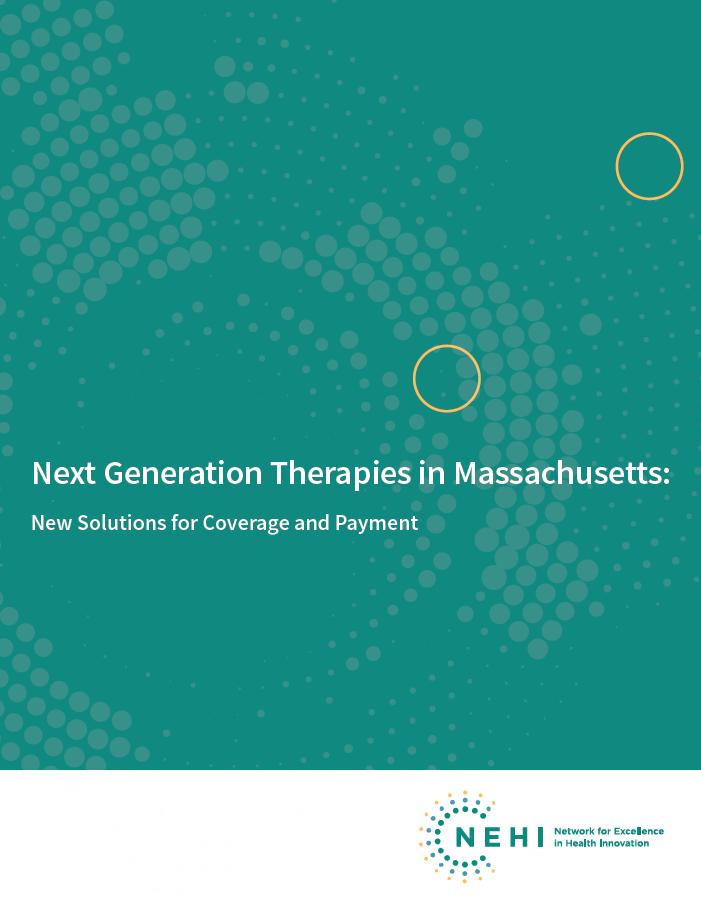
Credit: NEHI
March 5, 2019, BOSTON–NEHI (The Network for Excellence in Health Innovation) released a white paper today recommending that Massachusetts health care payers, providers, and the state’s biopharma industry come together in collaboration to address the unique payment and insurance coverage challenges raised by very highly innovative, “next generation” therapies.
A growing number of highly innovative new therapies are reaching the health care market that are notable both for the unprecedented benefits they may confer on patients and for the challenge they pose to conventional methods of evaluation, payment and cost management of new pharmaceuticals. The NEHI white paper urges early assessment of trends in the drug development pipeline to identify needed changes in coverage and payment policies and identifies five principles of cross-industry collaboration that should shape new policies.
“Massachusetts continues to play a leading role in health care reform and the drive to assure every citizen’s access to affordable health care,” said NEHI Executive Chair Wendy Everett. “We also have a front row seat on the global revolution in biology as many of the most promising new therapies have their roots in the Commonwealth’s laboratories and biopharmaceutical companies. Together we are facing difficult issues, but we have the talent, ability and commitment to harmonize our leadership on health care access with our leadership in medical innovation.”
NEHI’s recommendations are an outgrowth of discussions it generated among its member organizations in the health insurance, health care provider, patient advocate and life science sectors. The recommendations focus specifically on newly-approved therapies that can be characterized by these attributes:
- They employ an expanding number of scientific approaches to diagnose and treat disease, including various types of gene therapy, cell therapy, immunotherapy and other highly-innovative treatment approaches now in development.
- They are approved by the FDA to meet significant unmet medical needs or as promising significant improvements in patient health over current standards of care.
- Many are approved through the FDA’s pathways for accelerated review, and may be approved based on novel clinical trials, evaluated against novel endpoints (such as surrogate endpoints).
Dr. Everett added, “Therapies are emerging that cure previously untreatable diseases among some people, while other therapies are reducing disabilities among patients who previously had few effective treatment options. But we are also experiencing complex issues such as therapies that work in some patients but not in others and therapies that impose significant, one-time costs on a health plan for a patient who may move on to another health plan in a few months. All while we continue to work to ensure affordable health insurance and care for every resident of Massachusetts.”
The NEHI white paper recommends that payers, providers, patient groups and biopharmaceutical firms in the state engage in “horizon-scanning” processes to assess the implications of new drug development in a high-priority field such as oncology. The objectives of the horizon scans will be to anticipate therapeutic trends that may have a major impact on the health care system once new therapies are approved by the FDA; to gauge the accumulating impact on health care spending as the number of next generation therapies (many of them highly-personalized or used among small numbers of patients) grows over time; and to identify the need for new policies on coverage and reimbursement that ensures both patient access to new therapies and sustainable overall health care spending.
The white paper also recommends five guiding principles for collaboration among pharmaceutical manufacturers, providers and payers in the Commonwealth:
- Agreement in principle to link manufacturer reimbursement to demonstrations of lasting (durable) benefits among patients.
- Agreement in principle to expand reimbursement of physician-administered drugs to include direct contracting between payers and manufacturers, complemented by new methods for fair reimbursement of providers who must incur new costs for facilities and personnel in administering some next generation therapies.
- New collaboration among the state’s payers, providers and biopharmaceutical manufacturers to create standard templates for alternative contracting, such as outcomes-based pharmaceutical contracting.
- Greater engagement among all parties to measure the total costs and benefits that may accrue from use of next generation therapies. These may include non-pharmaceutical costs, such as medical services needed to support a new therapy, or conversely, the elimination of lifelong medical costs if a patient is cured from a previously incurable condition.
- New engagement on alternative policies on reinsurance and risk adjustment that may support the highest and best use of next generation therapies, recognizing longer-term costs and benefits.
Dr. Everett, who recently stepped down as the first Vice Chair of the Massachusetts Health Policy Commission, concluded, “We are urging all stakeholders and the state’s policymakers to obtain a more sophisticated understanding of the incredibly diverse array of next generation therapies now arriving, and to take action to assure patient access, affordability and sustained innovation in the Commonwealth.”
“We are fortunate that we have such valuable and talented innovators in our universities, life sciences industry, and health plans who are working on this complex set of issues. This work ultimately needs to be encouraged and expanded to encompass the entire array of new treatments we are likely to see over the next decade.”
###
Read the full report at https:/
Media Contact
Tom Hubbard
[email protected]
Original Source
https:/




